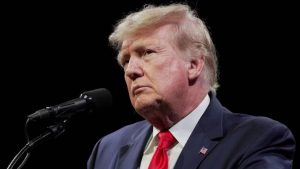US President Donald Trump’s recognition of Jerusalem as Israel’s capital prompted an almost universal diplomatic backlash and fears of new bloodshed in the Middle East.
Trump’s defiant move making good on a pledge made during his 2016 presidential campaign ends seven decades of US ambiguity on the status of the Holy City, which is vociferously claimed by both Israelis and Palestinians.
Trump said this marks the start of a “new approach” to solving the Israeli-Palestinian conflict.
“Israel is a sovereign nation with the right like every other sovereign nation to determine its own capital,” he said in a White House speech on Wednesday.
“It is time to officially recognize Jerusalem as the capital of Israel,” he said, urging calm and “the voices of tolerance to prevail over the purveyors of hate.”
But immediately the move sparked anger among Palestinians and their supporters.
The Palestine Liberation Organization announced a strike in protest across the West Bank on Thursday, while Hamas the Palestinian Islamist movement that runs the Gaza Strip called for a “day of rage” on Friday.
Hamas warned that Trump had opened “the gates of hell on US interests in the region.”
Although welcomed by Israel’s Prime Minister Benjamin Netanyahu as a “courageous and just decision,” Trump’s move left many angry US allies struggling to find a diplomatic response.
Saudi Arabia on Thursday blasted the move as “unjustified and irresponsible” and said it goes against the “historical and permanent rights of the Palestinian people.”
Palestinian president Mahmud Abbas said Trump’s “deplorable and unacceptable” move meant that the United States was withdrawing as a sponsor of the peace process.
Through gritted teeth, Britain described the move as “unhelpful” and France called it “regrettable.” Germany said plainly that it “does not support” Trump’s decision.
Eight countries including Britain, France and Italy pressed for an emergency meeting of the UN Security Council in response to the move, which was set for Friday.
The leaders of Muslim nations meanwhile deployed ever-harsher rhetoric to describe Trump’s decision.
Turkey and Iran, both vying for regional influence, tried to give voice to the anger felt by many across the Muslim world.
Ankara called the decision “irresponsible” and illegal. Tehran said it would “provoke Muslims and inflame a new intifada.”
Turkish President Recep Tayyip Erdogan called for a summit of the Organization of Islamic Cooperation (OIC), the main pan-Islamic body, in Istanbul next week to display joint action over Jerusalem.
Jordan and the Palestinians also requested an emergency meeting of the Arab League.
Trump also kicked off the process of moving the US embassy from Tel Aviv to Jerusalem.
In doing so, he begins to make good on a campaign promise dear to US evangelical Christian and right-wing Jewish voters as well as donors.
Trump’s predecessors, from Bill Clinton to George Bush, had made the same promise but quickly reneged upon taking office.
The 45th US president was determined to show his arrival in Washington spells the end of business as usual, suggesting his predecessors failed to act though lack of “courage.”






